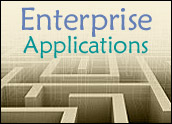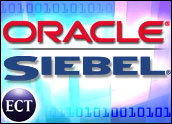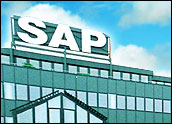
SAP clearly wants an out-of-court settlement of Oracle’s suit against it for intellectual property infringement, based on a joint SAP-Oracle case management conference statement filed in the U.S. District Court in the Northern District of California.
In March, Oracle filed suit against SAP and its TomorrowNow subsidiary, alleging that over the course of several months, SAP downloaded some 10,000 technical documents from Customer Connection, the entry point for Oracle licensed customers with active support agreements.
These materials included program updates, software updates, bug fixes, patches, custom solutions, and instructional documents across the entire PeopleSoft and JDE family of software products, according to Oracle’s account of events.
SAP’s purpose for collecting the materials, the complaint says, was to better service the customers it had lured away from Oracle, as well as to recruit new ones.
In the case management statement filed on Tuesday, SAP says a “prompt resolution” of the case is “in the best interests of all concerned.” It also favors mediation with an active or retired judge within the next few months.
95 Percent Settle
The fact that SAP wishes to settle out of court does not mean it is guilty or expects to lose the case, Peter Vogel, a partner with Gardere Wynne Sewell, told CRM Buyer. “Ninety-five percent of all lawsuits are settled out of court. This is to be expected, especially since SAP is the defendant.”
Indeed, SAP appears to be giving up little ground in the dispute. The filing suggests the main question concerns the interpretation of contracts between Oracle and its own customers. “Oracle’s statement of ‘facts’ is dramatic but inaccurate,” SAP says. “It ignores that TomorrowNow, on behalf of its customers, had a right to access Oracle’s Customer Connection Web site and to download support materials for the customers. It ignores that the downloads were performed by TomorrowNow, not SAP America or SAP AG. It ignores that none of the support materials downloaded by TomorrowNow were provided to SAP America or SAP AG.”
Contract Misinterpretation?
When customers licensed software applications from PeopleSoft or JD Edwards, they would typically purchase service contracts gave them the right to support materials that are now included on Oracle’s Customer Connection Web site, SAP notes.
TomorrowNow competes with Oracle in that it also provides support and maintenance for legacy PeopleSoft and JDE applications, it continues. “Oracle has provided training to employees of third-party support companies, including TomorrowNow, even after this case was filed. And, as Oracle conceded in its Amended Complaint … the companies that provide third-party support may access Oracle’s Web site to download support materials on behalf of their customers.”
Ultimately, the case is about whether TomorrowNow exceeded its customers’ rights in downloading certain materials, SAP says — not whether it committed “corporate theft on a grand scale,” as Oracle alleges.
Or Corporate Theft?
SAP knew what it was doing was wrong, Oracle counters. After the complaint was initially filed, TomorrowNow’s CEO Andrew Nelson defended the downloading as “legal” and “appropriate.”
In fact, the highest day of SAP downloading reportedly occurred a week after Oracle filed its complaint.
“Subsequently, however, SAP stopped all downloads and has now revealed that it has revamped its policies to permit downloading only at its customer locations, with a TomorrowNow employee to ‘facilitate’ the downloads,” Oracle says. “These course corrections have slowed the preservation negotiations and initial discovery process, but also speak to the merits of Oracle’s underlying allegations.”
Blood in the Water
Despite its vigorous defense, it appears that SAP recognizes its vulnerability to Oracle’s complaint. “The conduct that has been alleged, if true, is astonishing in its recklessness,” attorney Jonathan Handel of Troy & Gould told CRM Buyer.
“Theoretically, if Oracle were to establish that all of the downloads constituted copyright violations, it could conceivably win damages of (US)$1.5 billion at a $150,000 fine levied per violation,” he estimated.
The sane path for Oracle to take, Vogel suggested, would be to settle. “That is what I always tell my clients. They can either be angry about something that happened in the past, and spend a lot of money and resources litigating it — or they can invest that money in future development.”
Oracle’s track record is not encouraging for SAP, said Handel, who has represented several of Oracle’s customers.
“Oracle is extremely aggressive in protecting their IP (intellectual property). In fact, they deal with their customers on these matters to the point where they step over not legal lines but business lines,” he said.
“They treat their own customers like tubes of toothpaste to be squeezed for revenue,” Handel remarked. “They are not going to be easy people with whom to settle.”














































